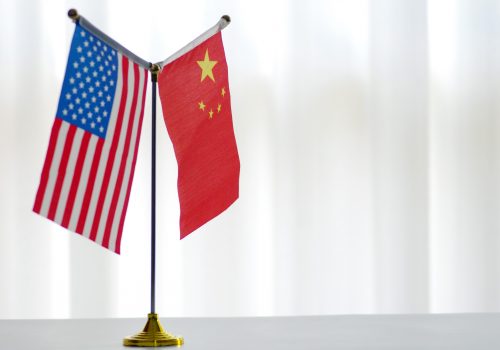A multilateral resurgence
A multilateral resurgence is a world that evolves after significant Sino-US confrontations occur on the scale of the 1963 Cuban Missile Crisis. Post-pandemic, both the United States and China step back from the precipice, realizing that their unrestrained, full-spectrum competition with one another could lead to disaster and mutual destruction. Technology becomes an area for gradually increased cooperation, and trust is developed with the help of confidence-building measures such as mutual high-level delegation visits. Multilateral agreements are renegotiated, the United States and China cooperate on sophisticated World Trade Organization (WTO) reform, and international frameworks for AI regulations are passed. There is increased transparency between the two superpowers on technology development. Chinese researchers are welcomed back into the United States, and China allows US academics to work in some of their institutes, too. Similar to arms control agreements with the Soviets, Washington and Beijing enter into negotiations with each other on standards for autonomous weapon systems plus ethical, safety, and privacy guidelines for the deployment of modern tech—later, additional partners also ascribe to them. These agreed rules and regulation standards boost research and development and the diffusion of new technologies, including to the developing world.
The years of protectionism, competition, and confrontation following the pandemic have taken a toll, ushering in a long economic recession for the developing world, an era of the impoverishment of the middle classes, and widespread political upheaval. A new phase of globalization begins slowly, yet thoroughly. Rules and fair regulations increase global trade, and the taxation of big multinational corporations enables growing state capacity. China and the United States back an effort for ensuring universal 5G for the whole world, enabling developing countries to leapfrog into a new age, sharing in the advantages of the Internet of Things (IoT). Steps are taken to mitigate resource scarcities, all the while engendering safer and more secure urbanization. Green technology becomes more the norm and biological breakthroughs, enabled by AI, facilitate increased food supplies and better healthcare, including protections against diseases. Tech researchers in emerging markets have access to international data and expertise, allowing them to develop applications that are tailored to their countries’ special needs and contexts.
The full text of this report is split across a collection of articles to give readers the opportunity to browse in any order. To return to the main page click here.

The GeoTech Center champions positive paths forward that societies can pursue to ensure new technologies and data empower people, prosperity, and peace.

